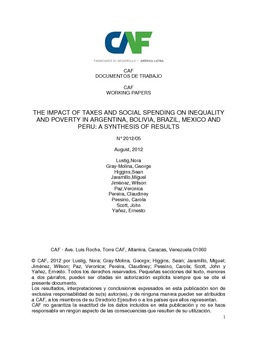| dc.contributor.author | Lustig, Nora | es |
| dc.contributor.author | Gray Molina, George | es |
| dc.contributor.author | Higgins, Sean | es |
| dc.contributor.author | Jaramillo, Miguel | es |
| dc.contributor.author | Jiménez, Wilson | es |
| dc.contributor.author | Paz, Verónica | es |
| dc.contributor.author | Pereira, Claudiney | es |
| dc.contributor.author | Pessino, Carola | es |
| dc.contributor.author | Scott, John | es |
| dc.contributor.author | Yáñez, Ernesto | es |
| dc.coverage.spatial | Argentina | es |
| dc.coverage.spatial | Brasil | es |
| dc.coverage.spatial | México | es |
| dc.coverage.spatial | Perú | es |
| dc.date.accessioned | 2014-10-15T20:04:15Z | |
| dc.date.available | 2014-10-15T20:04:15Z | |
| dc.date.issued | 2012 | es |
| dc.identifier.citation | Lustig, N., Gray-Molina, G., Higgins, S., Jaramillo, M., Jiménez, W., Paz, V., … Yañez, E. (2012). The impact of taxes and social spending on inequality and poverty in Argentina, Bolivia, Brazil, Mexico and Peru: a synthesis of results. CAF Working paper, 2012/05, Caracas: CAF. Retrieved from https://scioteca.caf.com/handle/123456789/234 | en |
| dc.identifier.uri | https://scioteca.caf.com/handle/123456789/234 | |
| dc.description.tableofcontents | We apply a standard tax and benefit incidence analysis to estimate the impact on inequality and poverty of direct taxes, indirect taxes and subsidies, and social spending (cash and food transfers and in-kind transfers in education and health). The extent of inequality reduction induced by direct taxes and transfers is rather small (2 percentage points on average) especially when compared with that found in Western Europe (15 percentage points on average). What prevents Argentina, Bolivia and Brazil from achieving similar reductions in inequality is not the lack of revenues but the fact that they spend less on cash transfers -especially transfers that are progressive in absolute terms- as a share of GDP. Indirect taxes result in that net contributors to the fiscal system start at the fourth, third and even second decile on average, depending on the country. When inkind transfers in education and health are added, however, the bottom six deciles are net recipients. The impact of transfers on inequality and poverty reduction could be higher if spending on direct cash tranfers that are progressive in absolute terms is increased, leakages to the nonpoor are reduced and coverage of the extreme poor by direct transfer programs is expanded. | en_US |
| dc.language.iso | eng | es |
| dc.publisher | CAF | es |
| dc.relation.ispartofseries | CAF Working paper, 2012/05 | es |
| dc.rights | CC-BY-NC | es_ES |
| dc.rights.uri | http://creativecommons.org/licenses/by-nc/4.0/ | es_ES |
| dc.subject | Impuestos | es |
| dc.subject | Equidad e inclusión social | es |
| dc.subject | Desarrollo social | es |
| dc.subject | Políticas públicas | es |
| dc.subject | Investigación socioeconómica | es |
| dc.subject | Finanzas públicas | es |
| dc.subject | Pobreza | es |
| dc.title | The impact of taxes and social spending on inequality and poverty in Argentina, Bolivia, Brazil, Mexico and Peru: a synthesis of results | es |
| dc.type | workingPaper | es |
| dc.publisher.city | Caracas | es |





